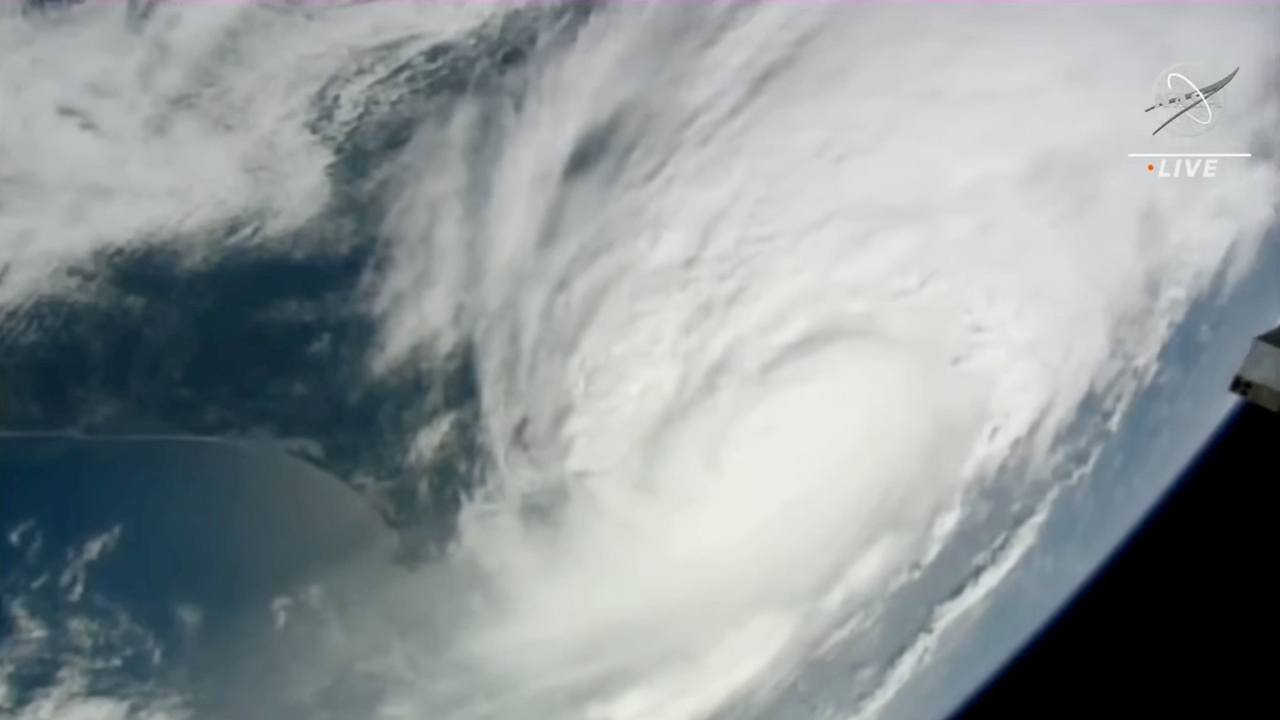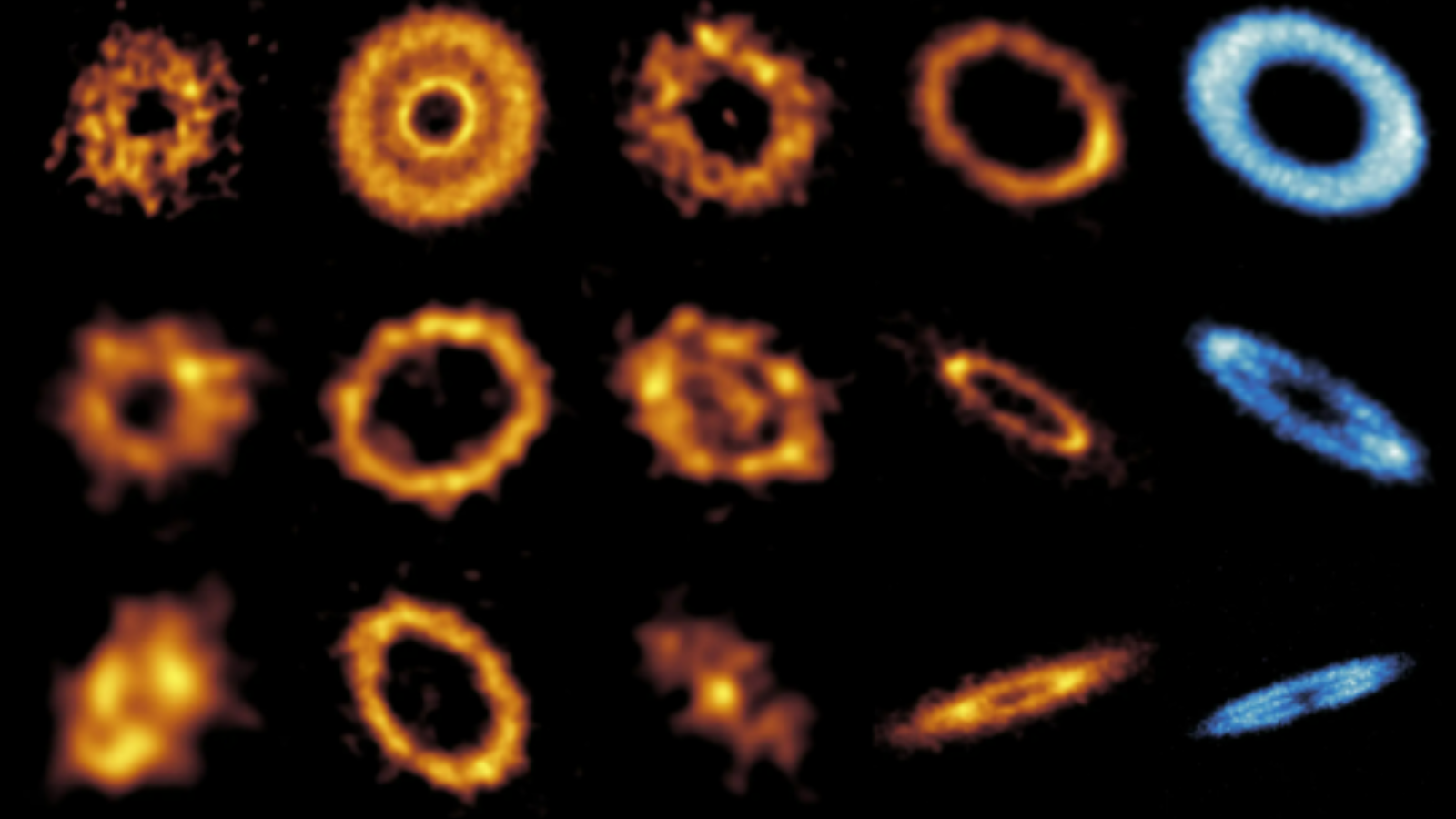Hurricane Idalia slams into Florida as astronauts and satellites track it from space (video, photos)
Idalia hit Florida today (Aug. 30) as a powerful Category 3 hurricane.
Satellites and astronauts alike watched a hurricane make its destructive landfall in Florida on Wednesday (Aug. 30).
Idalia began to hit Florida hours ago as a powerful Category 3 hurricane, bringing with it destructive storm surges, according to numerous local reports. Satellites have been monitoring the storm's progress to help protect local populations. Despite all efforts, injuries and possible deaths have already been reported, although precise numbers are hard to come by as the storm is ongoing.
Forecasters continue to keep a close watch.The hurricane was visible from the International Space Station (ISS), and NASA provided live footage from the orbiting complex showing the hurricane churn across the Gulf of Mexico toward Florida.
Related: Satellites watch powerful Hurricanes Idalia and Franklin churn (video)
Meanwhile, weather satellites from around the world are monitoring the storm to see what its impacts will be as it heads inland across Florida. Already there are numerous hurricane wind advisories, flood warnings and other possibilities of intense storm activity in multiple southeastern states.
"Significant impacts from storm surge will continue along the gulf coast of Florida within the storm surge warning, through this evening," the U.S. National Weather Service wrote in an advisory at 11 a.m. EDT (1600 GMT) on Wednesday.
Sunrise on Hurricane Idalia as it made landfall in Florida. Hopefully people heeded the evacuation warnings and those that remain are staying safe. pic.twitter.com/WOX2oadKOTAugust 30, 2023
A storm surge is expected along the southeastern U.S. coast, while hurricane-force winds are expected in Georgia and southern South Carolina. Flooding will occur in north Florida through central Georgia and South Carolina, and through eastern North Carolina, experts say.
Breaking space news, the latest updates on rocket launches, skywatching events and more!
Increased hurricane activity is one manifestation of human-induced climate change. Global warming is also tied to the intensification of wildfires, particularly in areas such as Canada in 2023, which have had wide-reaching impacts in terms of smoke, haze and particulates around the world.
During Hurricane Idalia's landfall, an impressive convective burst and abundant lightning were seen within its eye wall . pic.twitter.com/UhliFbyxLAAugust 30, 2023
Hurricane Idalia has already had an impact on the space industry. For example, United Launch Alliance elected to delay a planned launch for the U.S. Space Force due to the storm, rolling its Atlas V rocket off the pad at Florida's Cape Canaveral Space Force Station to take shelter.
NASA is also monitoring the arrival of the hurricane for potential impacts on the SpaceX Crew-6 astronauts on board the ISS. Crew-6 is expected to return to Earth, via an ocean splashdown off the Florida coast, this weekend. NASA officials told Space.com there are no changes to the schedule as of yet.
Hurricane Idalia becomes a major hurricane as it approaches Florida. pic.twitter.com/OqRq8jzJo4August 30, 2023
The current plan calls for Crew-6 to undock from the space station on Saturday (Sept. 1) at 9:05 a.m. EDT (1305 GMT). Splashdown is expected Sunday (Sept. 2) at 12:58 a.m EDT (0458 GMT). You can watch both events live here at Space.com, via NASA Television, when the broadcast happens.

Elizabeth Howell (she/her), Ph.D., was a staff writer in the spaceflight channel between 2022 and 2024 specializing in Canadian space news. She was contributing writer for Space.com for 10 years from 2012 to 2024. Elizabeth's reporting includes multiple exclusives with the White House, leading world coverage about a lost-and-found space tomato on the International Space Station, witnessing five human spaceflight launches on two continents, flying parabolic, working inside a spacesuit, and participating in a simulated Mars mission. Her latest book, "Why Am I Taller?" (ECW Press, 2022) is co-written with astronaut Dave Williams.

